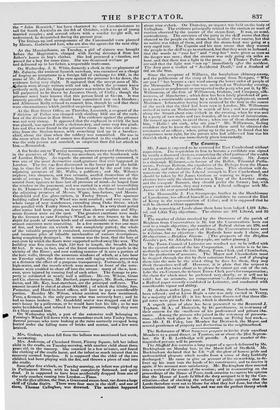At the Mansionhouse, on Tuesday, a girl of sixteen was
brought before the Magistrates, charged with having decampt d from her father's house in boy's clothes. She had procured a situation, and passed for a boy for some time. She was dismissed withare pr and delivered up to her father, a respectable tradesman.
On Wednesday, J. S. White, formerly a clerk in the employment of Mr. Zulueta, the eminent Spanish merchant, was examined on a charge of forging an acceptance to a foreign bill of exchange for I00/., in the name of Mr. Zulueta. The case against the prisoner broke down, the evidence being very slight. It appeared that the accepti.nces of Mr.
fitilueta were always written with red ink ; which the prisoner knew
perfectly well, yet the forged acceptance was written in black ink. The bill purported to be drawn by Jaeomeo Oneti, of Cadiz ; though the
prisoner must have known that this person lived at Gesoa. It was scarcely possible that he should have committed two such blunders; and Alderman Kelly refused to commit him, though he said that there were circumstances which justified suspicion against White.
At the Bow Street Office, on Thursday, Luscumb, a sergeant of the F division of Police was charged with stealing 165/. out of the cash, box of the division in Bow Street. The evidence against the prisoner was not very strong. It appeared that the cupboard in which the box was placed, was opened with a skeleton-key, and some very fine gimb- lets and files were found in the prisoner's room : he was also seen run- ning, from the Station-house, with something tied up in a handker- chief, about the time when the robbery was committed. He was in the room when the box of money was deposited in the cupboard ; and was the only person not searched, as suspicion then did not attach to him.—Remanded.


























 Previous page
Previous page